B3UNIT3LANGUAGE
新教材2023年高中英语Unit3SectionⅢUsingLanguage新人教版选择性必修第四册

下),unskilled workers saw their earnings fall.
2.mercy n. 仁慈;宽恕;怜悯
Farmers hunted us without mercy. 农民们毫不留情地捕猎我们。 Our ship was at the mercy of the wave. 我们的船任凭波浪摆布。 They had little mercy on their enemy. 他们对敌人决不留情。
Q
同义句改写 ①Though dressed poorly, the old man is in possession of a large company. →Though the old man dresses himself poorly, a large company is ___in__th_e__p_o_ss_e_s_s_io_n__o_f __ him. →Though dressed poorly, the old man ___ta_k_e_s_p_o_s_s_e_ss_i_o_n_o_f___ a large company. 尽管穿得很破,但这个老人拥有一家大公司。
Para. 3
C.The importance of sea protection.
Para. 4
D.The connection between exploration and pollution.
Para. 5
人教版九年级下册英语module 3 unit 3 language in use 教案
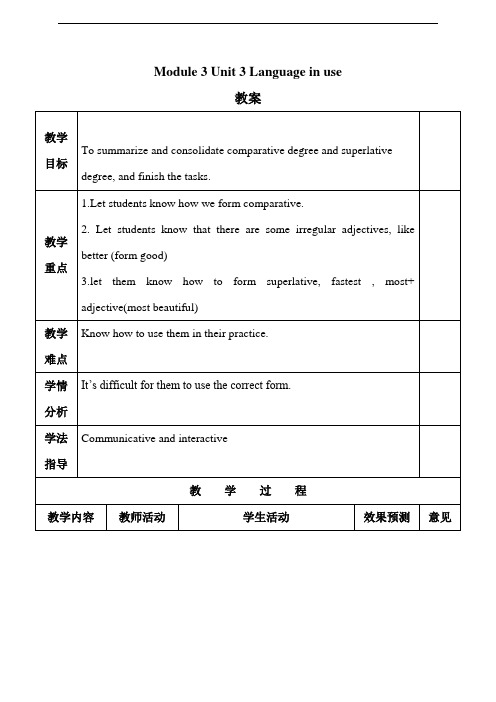
Step 2 Sentences presentation
Step 3 Language practice
Step 4 Reading
Step 5 Listening
Step 6 Homework
1.Showsome picturesto say what life was like in the early 1980s and what life is like today.
2. Read the email again. Find sentences that tell us:
1) There was not enough living space for people.
2) Most of the big cities were dirty and unhealthy.
3) Life was harder for children in those times.
3. Write examples.
1) People lived in very small houses, very close to each other, with no space for children to play.
教学难点
Know how to use them in their practice.
学情分析
It’s difficult for them to use the correct form.
学法指导
Communicative and interactive
教学过程
教学内容
教师活动
学生活动
效果预测
意见
1) People arewealthier today, and they live longer than they did in the past.
七年级英语下册 Module 3 Unit 3 Language in use教案
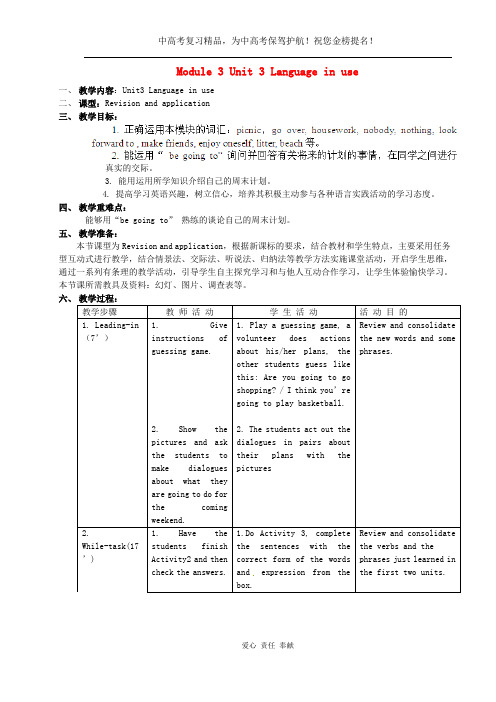
Module 3 Unit 3 Language in use一、教学内容:Unit3 Language in use二、课型:Revision and application三、教学目标:真实的交际。
3. 能用运用所学知识介绍自己的周末计划。
4. 提高学习英语兴趣,树立信心,培养其积极主动参与各种语言实践活动的学习态度。
四、教学重难点:能够用“be going to”熟练的谈论自己的周末计划。
五、教学准备:本节课型为Revision and application,根据新课标的要求,结合教材和学生特点,主要采用任务型互动式进行教学,结合情景法、交际法、听说法、归纳法等教学方法实施课堂活动,开启学生思维,通过一系列有条理的教学活动,引导学生自主探究学习和与他人互动合作学习,让学生体验愉快学习。
本节课所需教具及资料:幻灯、图片、调查表等。
教学步骤教师活动学生活动活动目的1. Leading-in(7’)1. Giveinstructions ofguessing game.2. Show thepictures and askthe students tomake dialoguesabout what theyare going to do forthe comingweekend.1. Play a guessing game, avolunteer does actionsabout his/her plans, theother students guess likethis: Are you going to goshopping? / I think you’regoing to play basketball.2. The students act out thedialogues in pairs abouttheir plans with thepicturesReview and consolidatethe new words and somephrases.2.While-task(17’)1. Have thestudents finishActivity2 and thencheck the answers.1.Do Activity 3, completethe sentences with thecorrect form of the wordsand expression from thebox.Review and consolidatethe verbs and thephrases just learned inthe first two units.2. Ask the students to write things they are going to do for the coming weekend as many as they can. 3,4. Organization 2. The students will begiven three minutes to writethings they are going to dofor the coming weekend asmany as they can..3. They will have a match forwriting on the blackboard.(See which group can writethe most correct sentencesof the four groups.)4. Two students will collectthe sentences on theblackboard. And see whichgroup will do the best.Consolidateexpressions and mainsentence structurethat they’ve learned.3. Post-task(19’)1. Organization2. Organization 1.Students interview theirbest friends about theirplans for the comingweekend, and fill in thetable of Activity5 with theinformation they get.2. Make a report about theirbest friends’ weekendplans, using the informationin the form. Then share withthe class.1.To practice the skillof speaking.2. Enable students totalk about theirweekend plans.3. Ask the students to wri te about their own weekend plans.4. Organization. 3.Write a plan for the comingweekend.4. Ask some students to writetheir plans on theblackboard and share theirplans with the class. See whohas the most wonderfulweekend.To practice the skillof writing.4. Summary (1’)Sum up the keystructure: begoing to do…Students conclude the usageof the key structure.Let the studentsinternalize thegrammar they’velearned in this module.5. Homework(1’)Write a plan for the May Day holiday.板书设计Module 3 Making PlansUnit 3 Language in useI’m going to check my email.What are you going to do at the weekend?Are we going to meet here?No, we aren’t.达标训练题一、选择正确的答案:()1. We are all looking forward __________ the new film.A. to watchB. watchesC. to watchingD. watching( ) 2. — What are you going to do next week?— We ____________ a picnic.A. haveB. are going to haveC. is going to haveD. will be( ) 3. I often ___________ an hour reading English.A. takeB. costC. spendD. pay( ) 4. Don’t __________ silly!A. isB. areC. /D. be( )5. We aren’t going to take a walk__________ it’s raining now.A. becau seB. butC. andD. so( )6. I want to go sh opping. I’m going to ______ some clothes.A. washB. sendC. giveD. buy( )7. — Are you going to see a movie this evening?— _______. I’m going to have a piano lesson.A. Yes, I amB. No, I’m notC. Yes, I doD. No, I don’t二、短文填空:Hell o, boys and girl. I’m Jim Smith, I’m 13 years old. I’m 1.___________ England and I’m English. This is my first time to come to China. I like 2._____________ very much. I’m going to have a busy 3._________________. On Saturday morning, I’m going to 4._______________ my homework, but in the afternoon, I’m going some 5._________ and I’m going to take a 6.___________ in the Summer Pala ce. On Sunday morning, I’m going to a basketball match, and I’m going to 7.___________ my favourite player. I hope my favourite team will 8.___________ the match. In the afternoon, I’m going to help my mother do some 9.__________ __, for example, to clean my house. I’m a happy boy. Do you want to make 10.______________ with me?。
Module 3 Unit 3 Language in use 说课稿

Module 3 My schoolUnit 3 Language in use一、说教材1、说教材的地位和作用本模块以学校为中心话题, 围绕“介绍并询问所在学校及教室内外的情况”展开学习。
.本节课的教学内容是第三模块的第三节课。
本节课需要一课时完成。
在前两节课中,同学们已学习了“ there be”句型、基数词、地点及方位介词的使用。
本节课重点是运用所学的句型向他人介绍自己的学校。
熟练掌握“ there be ”句型的肯定句、否定句和一般疑问句。
学情分析:(1).由于生源不同的原因,我校刚入学的学生在英语学习方面存在着个体差异性。
来自农村小学的学生虽学了英语,但支离破碎,零零落落,等同没学。
所以在知识和能力上,我们在为没学的学生打好扎实基础的同时,必须每节课为那些高起点学生拔高。
不同层次的学生都能找到成就感.(2). 才走出小学校园的学生大部分抽象思维能力较低,形象思维能力强,热情高但注意力容易分散。
自我认识较模糊、片面,而在乎他人的评价。
所以要特别注重教学方法的灵活性和评价的技巧性。
2、说教学目标根据本教材的结构和内容分析,结合着七年级学生的认知结构及其心理特征,我制定了以下的教学目标:知识目标:1.there be肯定句、否定句和一般疑问句。
2. 地点、方位介词及短语:in ,on,at, under,behind,in front of,next to的使用。
能力目标:1.能用所学句型描述自己的教室、学校等。
2.能写出介绍自己学校的简单句子。
情感目标:培养学生热爱学校,热爱自己的家园的意识。
3、说教学重难点本着初中新课程标准,在吃透教材的基础上,我确定了以下的教学重点和难点:1、there be句型的说与写。
2、介词next to、in front of、behind的说与写二、说教法英语是一种交流沟通的工具,重在使学生运用语言与人交流沟通。
在教学过程中,要使学生在听、说、读、写各个方面都得到锻炼与提升。
Module3Unit3Languageinuse教案

此外,在学生小组讨论环节,我尝试扮演引导者的角色,让学生自主发现问题、分析问题并解决问题。这种教学方式取得了较好的效果,学生们在讨论中碰撞出不少火花。但在引导过程中,我也发现部分学生对于开放性问题的思考还不够深入,这可能需要我在今后的教学中,更加关注学生的思维训练。
-口语表达:能够熟练运用所学词汇和句型,在实际场景中进行对话交流。
-听力理解:掌握听力材料中的关键信息,提高对地点描述的听力理解能力。
举例:
在教学过程中,教师应着重讲解词汇的拼写规则,通过示例和练习,确保学生掌握词汇的正确使用。同时,通过角色扮演等互动活动,让学生在实际语境中练习句型和口语表达。
2.教学难点
在总结回顾环节,学生对今天所学的知识有了更深刻的认识。但我认为,仅仅依靠课堂上的学习还不够,还需要学生在课后进行巩固练习。因此,我计划布置一些与实际生活相关的作业,让学生在课后运用所学知识,提高他们的实践能力。
1.加强听力训练,提高学生的听力理解能力。
2.针对容易混淆的词汇,设计更多有效的记忆方法。
-难点词汇:部分地点词汇的拼写和发音容易混淆,如library和post office。
-难点句型:句型中的方位词使用,如near/next to/beside的区分和正确运用。
-听力理解:在听力材料中快速捕捉并理解地点描述信息。
-口语表达:在对话中灵活运用所学知识,注意时态和语态的正确使用。
举例:
3.重点难点解析:在讲授过程中,我会特别强调词汇的正确拼写和发音,以及Where is the ...? It's near/next to/beside...这些重点句型的运用。对于难点部分,我会通过举例和对比来帮助大家理解。
外研版八年级上册英语 Module 3 Unit3 Language in use
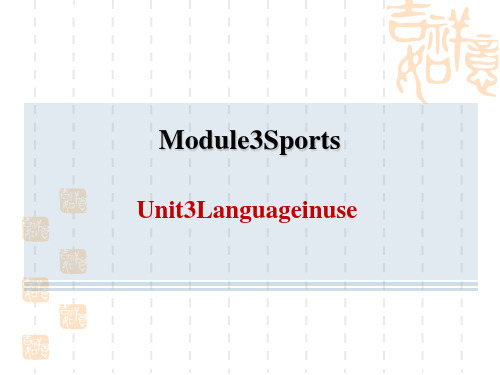
5. Isawher_____C___flowersinthegardenwhenIpassedby. 【2021·天水期中】 A. towaterB. waterC. wateringD. watered
【 点 拨 】 分 析 句 子 结 构 可 知 , 此 处 考 查 seesb. doingsth.看见某人正在做某事, 为固定搭配。
us.
against
beat
Butthisyearwewanttodo________6better
(well).
Butitis________________7 moredifficult
topractiseinwinterbecausethedaysare________8
(difficult) (short)
6. Everymorning, Ioftenseegroupsofmiddle--
agedwomen________inthesquare. A
A. danceB. todanceC. dancesD. danced
7. Dreamsarepowerfulandtheycandriveyoutoworkhardandb C ecome________thanbefore. 【2020·云南】
Heplaysbasketbiasllwonderfully.
IhopeIcanplaybasketballas________3 (good) ashim.
Iaminourschoolteamandwearegoingtoplay________4 well
(against) No. 1MiddleSchool. Lastyearthey________5 (beat)
Module 3 Unit3 Language in use 教案
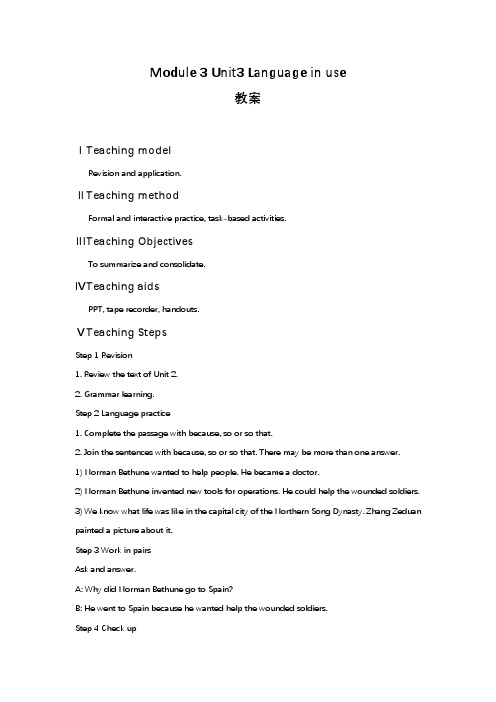
Module 3 Unit3 Language in use教案ⅠTeaching modelRevision and application.ⅡTeaching methodFormal and interactive practice, task-based activities.ⅢTeaching ObjectivesTo summarize and consolidate.ⅣTeaching aidsPPT, tape recorder, handouts.ⅤTeaching StepsStep 1 Revision1. Review the text of Unit2.2. Grammar learning.Step 2 Language practice1. Complete the passage with because, so or so that.2. Join the sentences with because, so or so that. There may be more than one answer.1) Norman Bethune wanted to help people. He became a doctor.2) Norman Bethune invented new tools for operations. He could help the wounded soldiers.3) We know what life was like in the capital city of the Northern Song Dynasty. Zhang Zeduan painted a picture about it.Step 3 Work in pairsAsk and answer.A: Why did Norman Bethune go to Spain?B: He went to Spain because he wanted help the wounded soldiers.Step 4 Check up1. Complete the sentences with the correct form of the words in the box.2. Complete the sentences with the correct form of the expressions in the box.3. Listen and choose the correct answer.4. Read the passage and choose the best title.Step 5 Module task1. Write about your hero.Plan a passage with three or four paragraphs like this:Paragraph 1: Introduce your hero.Paragraph 2 and 3: Say what he/she did.Paragraph 4: Why you think he/she is the greatest hero.2. Present your hero to the class.3. Work in pairs. Make a list of the heroes you can think of.1) Think of heroes from different areas (sport, environmental protection) or different careers (writer, scientist)…2) List your heroes.Step 6 HomeworkMake a poster about your hero and present it to the class.感谢您的阅读,祝您生活愉快。
b3 unit 3 using language 教案
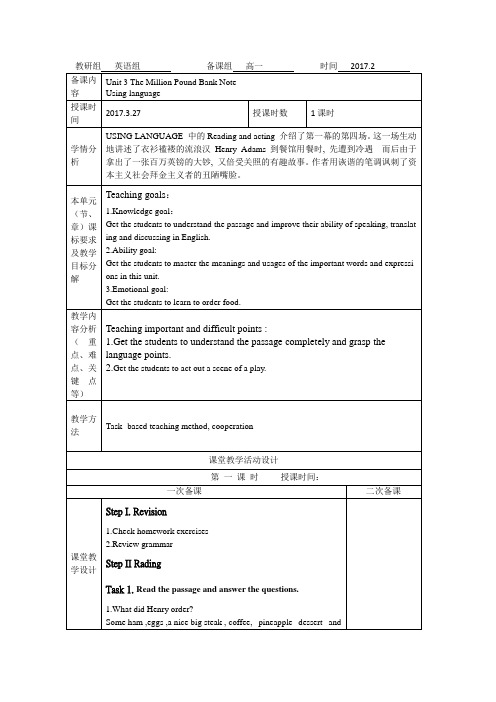
教研组英语组备课组高一时间2017.2备课内容Unit 3 The Million Pound Bank Note Using language授课时间2017.3.27 授课时数1课时学情分析USING LANGUAGE 中的Reading and acting 介绍了第一幕的第四场。
这一场生动地讲述了衣衫褴褛的流浪汉Henry Adams到餐馆用餐时, 先遭到冷遇 而后由于拿出了一张百万英镑的大钞, 又倍受关照的有趣故事。
作者用诙谐的笔调讽刺了资本主义社会拜金主义者的丑陋嘴脸。
本单元(节、章)课标要求及教学目标分解Teaching goals:1.Knowledge goal:Get the students to understand the passage and improve their ability of speaking, translat ing and discussing in English.2.Ability goal:Get the students to master the meanings and usages of the important words and expressi ons in this unit.3.Emotional goal:Get the students to learn to order food.教学内容分析(重点、难点、关键点等)Teaching important and difficult points :1.Get the students to understand the passage completely and grasp the language points.2.Get the students to act out a scene of a play.教学方法Task- based teaching method, cooperation课堂教学活动设计第一课时授课时间:一次备课二次备课课堂教学设计Step I. Revision1.Check homework exercises2.Review grammarStep II RadingTask 1. Read the passage and answer the questions.1.What did Henry order?Some ham ,eggs ,a nice big steak , coffee, pineapple dessert andbeer.2.How many times did Henry order the same food?Twice .3.How much money did Henry pay for his bill at last?None. (As for the bill, sir, please forget it.)Task 2. Find some useful expressions about ordering food in this passage.I’d like some ham and eggs and a nice big steak.And I’ll have a large glass of beer.Same thing again, please.Useful expressions about ordering food.Waiters/Waitress: Can I help you?I’ll take your order in a minute.Are you ready to order, Sir/ Madam?What would you like?Enjoy your meal. Here’s your bill.Customer: I’d like…Do you have…?What do you suggest? I’ll have that. The bill, please.Can I have the check, please?Task 3. Read Act One, Scene 4, then choose the best words to describe the restaurant owner’s attitudes towards Henry.①sympathetic (同情的) ②flattering (奉承的)③unfriendly ④respectful (恭敬的)When asking Henry to pay the bill, he is _______.When he finds Henry is a “millionaire”, he is ______. Discuss the change of the owner’s attitude and why?Task 4.DiscussionIs money everything?Step III Language points.1.Watch the movie The Million Pound Bank-note in the free class. Read and perform the whole play with the help of the scripts in the book.2.Review what you have learnt in the whole unit and next class we’ll have a revision class.(教材原句) It is well-known that Americans like to eat a lot.分析: it 是________,that 引导的是___________________。
外研版九年级英语上册Module3Unit3Languageinuse教案

(五)总结回顾(用时5分钟)
今天的学习,我们了解了现在完成时态的基本概念、旅行相关词汇以及在实际场景中的应用。同时,我们也通过实践活动和小组讨论加深了对英语在旅行中使用的理解。我希望大家能够掌握这些知识点,并在日常生活中灵活运用。最后,如果有任何疑问或不明白的地方,请随时向我提问。
其次,在实践活动环节,虽然学生们在分组讨论和角色扮演活动中表现积极,但我注意到有些学生在用英语交流时仍然显得不够自信。为了提高学生的英语口语表达能力,我计划在接下来的课程中多增加一些类似的实践环节,鼓励学生多开口说英语,增强他们的自信心。
此外,关于旅行相关词汇的教学,我发现学生们在词汇运用方面还存在一些问题,如搭配不当、用词不准确等。在今后的教学中,我会着重强调词汇的正确使用,并通过更多的实例和练习帮助学生巩固记忆。
最后,今天的课程让我再次认识到,作为一名英语教师,我要不断更新教学方法,努力提高教学质量,以激发学生的学习兴趣和积极性。在今后的教学中,我会根据学生的实际情况,调整教学策略,使课堂更加生动有趣,让学生在轻松愉快的氛围中学习英语。
三、教学难点与重点
1.教学重点
(1)词汇:旅行相关词汇的掌握,如passport, customs, currency, luggage等。
举例:学生在描述旅行经历时,能够准确使用这些词汇。
(2)语法:现在完成时态的运用。
举例:学生能够运用现在完成时态描述旅行中已经完成的动作或经历。
(3)对话:模拟机场、酒店等场景的英语对话。
举例:学生能够根据场景进行流畅的英语对话,掌握相关表达。
(4)写作:写一篇关于旅行经历的短文。
初中九年级英语 Module 3 Unit 3 Language in use课件

3. How was Liu Xiang helped by a special programme in the past? His races was recorded and his performance was compared with best sports stars.
Make a class sports survey.
Eg: 1.What sports do you like? 2.How often …? 3. Do you like to…or…?
Exercise: Choose the best answer.
Complete the conversation with the correct form of the words in the box. Ted: Did you watch the match on Sunday? Bob: Yes, I did. I’m a big___fa_n__ of BIG. Ted: Oh, BIG is my favorite__te_a_m_, too. Bob: I’m very happy because they did so well in the _c_o_m_p_e_t_it_io_n_ Ted: Yes, they have scored so many _p_o_i_n_ts_this season. Bob: They’ve _w__o_n__ many matches…. Ted: And that must have __e_n_c_o_u_r_a_g_e_d___them a lot. Bob: Do you think they’ll___d_e_fe_a_t__ HAS? Ted: Yes, I do. They’ve___t_r_a_in_e_d____ very hard this season. Bob: Yes, and I think BIG play very well__co_m__p_a_r_e_d__ with HAS now.
七年级英语上册 Module 3 Unit 3《Language in use》课件 外研

• 肯定回答:Yes, there is / are.
• 否定回答:No, there isn’t / aren’t. ---Is there a dog in the classroom? 教
室里有一只狗吗? ---Yes, there is. 有。 ---Are there any boats in the river? 河
---How many students are there in the classroom? 教室里有多少学生?
---There’s only one. / There are nine. 只有一个。/有九个。
There be 句型
Exercises
1. 你们有校办公室吗?是的,有。 Are there any school offices? Yes, there are.
里有船吗?
• ---No, there aren't. 没有。
Grammar
(3)特殊疑问句:
How many . . . are there (+地点状语)?
“某地有多少人或物?”回答用There be . . . There’s one. / There are two / some . . . 有时直接就用数字来回答。One. / Two . . .
Grammar
(1)there be的否定句,即在be的后面加上 not。
There be + not + (any) + 名词+地点状语。 There aren’t any books on the desk. 桌子
上没书。
(2)there be句型的疑问句就是将be提到句 首:
Be there + (any) +名词+地点状语?
最新七年级英语上册 Module 3 Unit 3 Language in use教案 (新版)外研版(1)
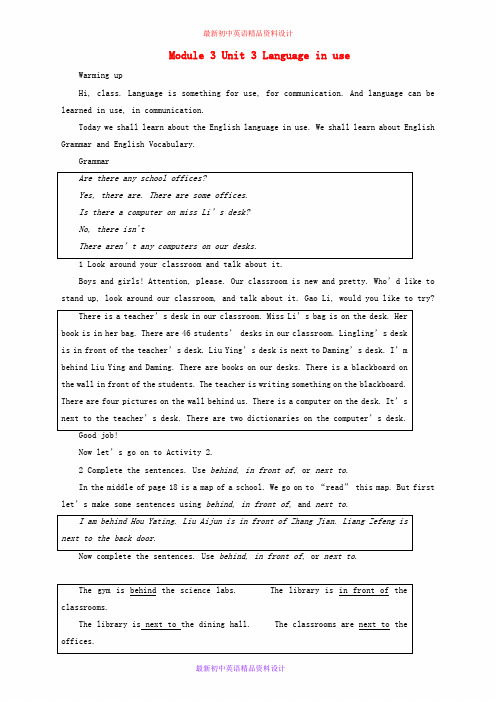
Module 3 Unit 3 Language in useWarming upHi, class. Language is something for use, for communication. And language can be learned in use, in communication.Today we shall learn about the English language in use. We shall learn about English Grammar and English Vocabulary.GrammarAre there any school offices?Yes, there are. There are some offices.Is there a computer on miss Li’s desk?No, there isn'tThere aren’t any computers on our desks.1 Look around your classroom and talk about it.Boys and gir ls! Attention, please. Our classroom is new and pretty. Who’d like to stand up, look around our classroom, and talk about it. Gao Li, would you like to try?There is a teacher’s desk in our classroom. Miss Li’s bag is on the desk. Herbook is in her bag. T here are 46 students’ desks in our classroom. Lingling’s deskis in front of the teacher’s desk. Liu Ying’s desk is next to Daming’s desk. I’m behind Liu Ying and Daming. There are books on our desks. There is a blackboard onthe wall in front of the students. The teacher is writing something on the blackboard.There are four pictures on the wall behind us. There is a computer on the desk. It’snext to the teacher’s desk. There are two dictionaries on the computer’s desk.Good job!Now let’s go on to Acti vity 2.2 Complete the sentences. Use behind, in front of, or next to.In the middle of page 18 is a map of a school. We go on to “read” this map. But first let’s make some sentences using behind, in front of, and next to.I am behind Hou Yating. Liu Aijun is in front of Zhang Jian. Liang Zefeng isnext to the back door.Now complete the sentences. Use behind, in front of, or next to.The gym is behind the science labs. The library is in front of the classrooms.The library is next to the dining hall. The classrooms are next to the offices.The science labs are in front of the gym. The dining hall is next to the library.The offices are next to the science labs. The classrooms are behind thelibrary.The science labs are next to the offices.Make similar sentences telling about our classroom. Talk as they do.(仿说)The teacher’s office room is behind the gym. The school hospital is in front of the library.The library is next to the post office. The teaching buildings arenext to the bike hall. The science labs are in front of the Rest Room. The dining hall is next tothe school gate.The school shops are next to the dormitory buildings. The school bank is behindthe library.The newspaper stands is next to the front wall.■Voca bulary3 complete the word map with these words .On page 19, in the box, you see several words. Put them in the word map.You may draw a word map of you own.blackboard classroom dictionary gym officescience lab■Around the worldWe get around the world again! This time , we go to schools in the UK!While getting around schools in the UK, try to cut (断句)/ the sentences into parts, blacken (涂黑)the predicates, shade (加影)the connectives and underline (划线)theschoolclassroom office Libraryblackboard desk dictionary textbook newspaper magazinegym Eating roomexpressions.Schools in the UKWrite about your school in Taiyuan, Shanxi.■Module task→ Writing a letter describing your school.4 Work in Pairs.Write a letter describing your school.Welcome to our school.This is our school. There are18 classrooms.This is our classroom. There are 46 students.The re’s a blackboard and a teacher’s desk but there isn’t a computer.This is our classroom. There are 40 students.This is our class library. There are 500 books.There’s a computer and a TV but there isn’t a blackboard!。
Module 3 Unit 3 Language in use教案 (新版)外研版
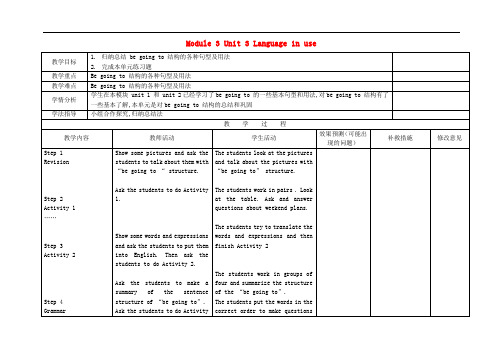
教学目标
1.归纳总结be going to结构的各种句型及用法
2.完成本单元练习题
教学重点
Be going to结构的各种句型及用法
教学难点
Be going to结构的各种句型及用法
学情分析
学生在本模块unit 1和unit 2已经学习了be going to的一些基本句型和用法,对be going to结构有了一些基本了解,本单元是对be going to结构的总结和巩固
Step 7
Around the world
Step 8
Activity 4
Step 9
Homework
Show some pictures and ask the students to talk about them with“be going to“structure.
Ask the students to do Activity 1.
Ask the students to read and learn about weekend plans around the world.
Ask the students to work in groups of three and talk about what they are going to do at the weekend.
Ask the students to do Activity 3
Ask the students to think about the sentence structure of special question of“be going to”, then ask the students to finish the special question exercises.
外研版英语九年级下册:Module3 Unit 3 Language in use 教案

Module 3 Life now and thenUnit 3 Language in use【Teaching aims】To summarize and consolidate comparative degree and superlative degree, and finish the tasks. 【Teaching method】Task-based approach; interactive approach.【Teaching procedures】Step 1 Listening1. Listen and complete he table.Grandmother MotherAge to start schoolAge to start workAge to get marriedNumber of childrenAge to stop working2. Let Ss listen again, and w rite a passage comparing the lives of the speaker’s gran dmother and mother in Activity 6.Step 2 Around the world: Cars1. Ask the students to look at the picture and discuss what they can see.2. Read through the information with the whole class.3. Fill in the blanks.1) The modern car has changed life a _________ deal.2) Using horses for travel was________, and of course walking was even ________.3) Cars allow people to travel long distances________, in comfort and________.4) It was almost ___________ to get rid for the manure of the horses.5) The cars may cause_________, but the first cars actually made cities_________.4. Ask the students to check with a partner.5. Check the answers:6. Read the passage together.Step 3 Module task:Organizing a debate.1. Work in groups. Read the motion of the debate.Health is more important than wealth.2. Now decide who is for the motion and who is against it. You can use some of the following ideas:For: Without health, wealth means nothing.You can enjoy life better if you are healthy.Against:It is hard to be healthy without wealth.You can enjoy life better if you are wealthy.3. Prepare your arguments. Give examples to support your ideas.4. Hold the debate.Those for the motion give their opinions.Those against the motion give their opinion.Take turns to say what you think about each other’s arguments.5. Discuss and find out whether most people are for or against the motion.Step 4 Exercises:1.Which season do you like _______, winter or summer?—Summer.A. wellB. betterC. bestD. the best2. Many students think it _______ to learn English by using news.A. interestB. interestingC. interested3. It is said that Shanghai students have scored the ________ in an international test.A. highB. higherC. highest4. — Mom, what do you think of our new house?—It’s nice, and it’s _________ than t he old one.A. bigB. biggerC. biggestD. the biggest5. Lin Fang comes home _____ than before this term. She doe sn’t have so many classes in the afternoon.A. earlyB. earlierC. lateD. later6. “Have you read today’s newspaper?”“Yes. It’s really boring. There’s ______ in it.”A. something newB. nothing newC. anything new7. —How do you like the book you read yesterday?—Oh! It’s one of ______ books I’ve ever read.A. interestingB. more interestingC. most interestingD. the most interestingHomeworkWrite a passage about the changes in your hometown, using the comparative and superlatives of adjectives and adverbs we have learnt.。
- 1、下载文档前请自行甄别文档内容的完整性,平台不提供额外的编辑、内容补充、找答案等附加服务。
- 2、"仅部分预览"的文档,不可在线预览部分如存在完整性等问题,可反馈申请退款(可完整预览的文档不适用该条件!)。
- 3、如文档侵犯您的权益,请联系客服反馈,我们会尽快为您处理(人工客服工作时间:9:00-18:30)。
syn. a man of polish
a polished h. open or away from a surface
They pried open a sticky can of blue paint.
Her car trunk
ter and land, without either fleet or army.
Museums in the developing world often have fewer security measures and thus remain more vulnerable to thefts.
Syn. Epoch, age, times
mark [form] an epoch in science
an entire historical epoch epoch-making, epoch-marking, milestone
5. hook up to: connect or attached (sth.) to (sth. else) with or as if with a hook
We would adopt drastic measures to cut back not only on carbon dioxide but acid rain and urban smog as well.
3. tranuil: calm, uiet and undisturbed
6. elegant: tasteful, fashionable, graceful
an elegant woman
elegant clothes
elegant furnishings
an elegant gentleman
an elegant vase
an elegant writer
My computer is hooked up to the Internet, so I can communicate with my students at home via email.
The alarm systems in the banks are hooked up to the local police station. Will you hook me up at the back? (fasten (a garment) by means of hooks and eyes)
4. era: a period of history or a long period of time
the era of space travel
our era produces a host of heroes and heroines.
We are now in a great new era of information.
Be vulnerable to earthuake/ fire Cf. be liable to earthuakes/ cold/ infection
2. urban: of, situated in or living in a city or town
Motor vehicle emissions, to a large extent, are responsible for urban air pollution.
a tranuil life in the country
the hospital aims to bring peace and comfort to the dying by offering expert care and a tranuil atmosphere.
syn. calm tranuil serene peaceful These adjectives denote absence of excitement or disturbance.
